Cultural Change at Commonwealth Bank (CBA) - Stakeholder Value Report
VerifiedAdded on 2021/04/24
|7
|1669
|23
Report
AI Summary
This report analyzes the stakeholder trust crisis experienced by the Commonwealth Bank of Australia (CBA), highlighting instances of ethical breaches such as money laundering. It explores the bank's violation of corporate social responsibility (CSR) and the implications of shifting from a shareholder to a stakeholder value approach. The report discusses how such a transformation affects business competitiveness, operational strategies, and human resource management (HRM), emphasizing the importance of ethical practices and employee motivation. It also offers suggestions for the incoming CEO of CBA to advance an ethical corporate culture, aligning principles and values across all levels of the organization to rebuild stakeholder trust and create long-term value. The analysis is supported by various academic references to strengthen the arguments presented in the report.
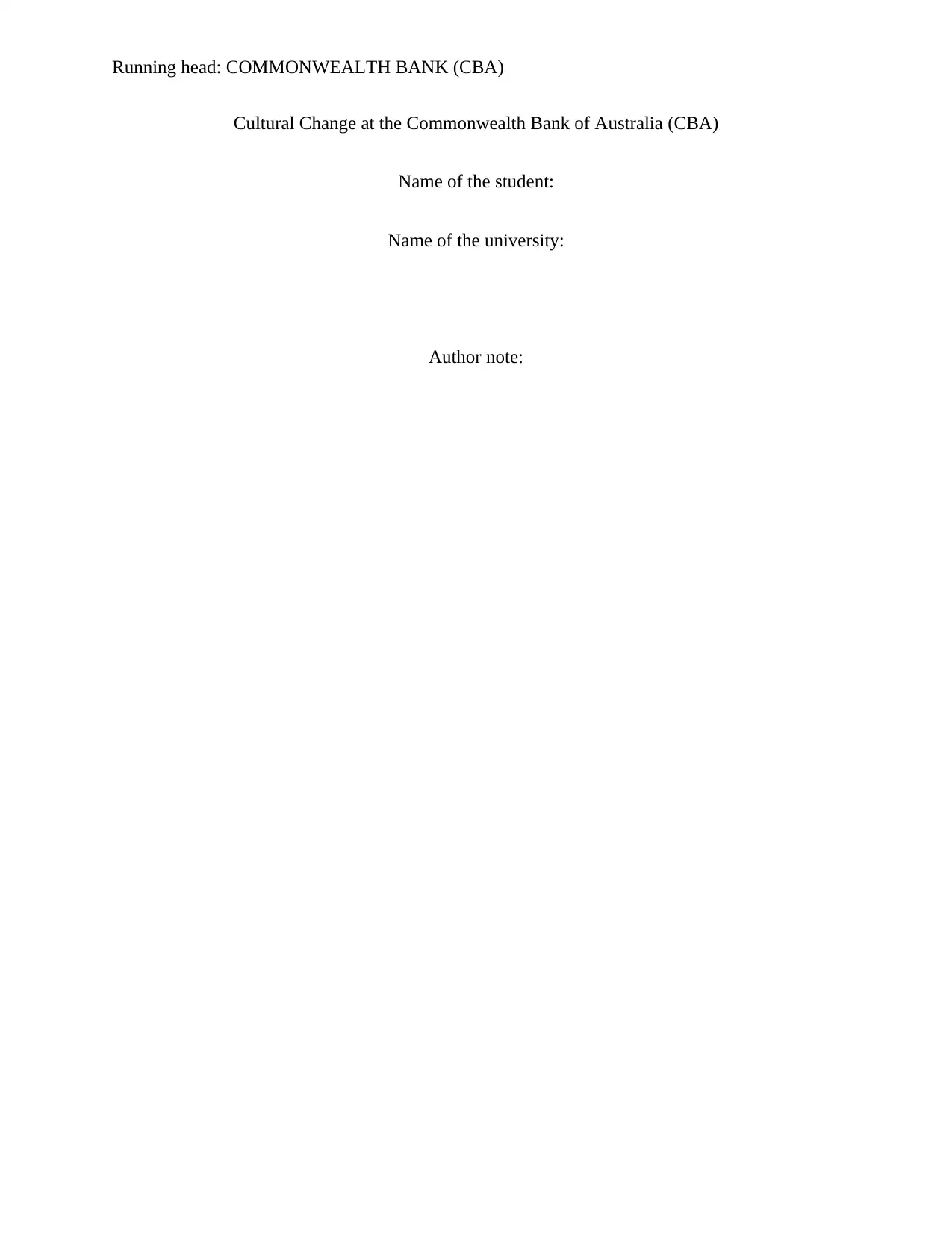
Running head: COMMONWEALTH BANK (CBA)
Cultural Change at the Commonwealth Bank of Australia (CBA)
Name of the student:
Name of the university:
Author note:
Cultural Change at the Commonwealth Bank of Australia (CBA)
Name of the student:
Name of the university:
Author note:
Paraphrase This Document
Need a fresh take? Get an instant paraphrase of this document with our AI Paraphraser
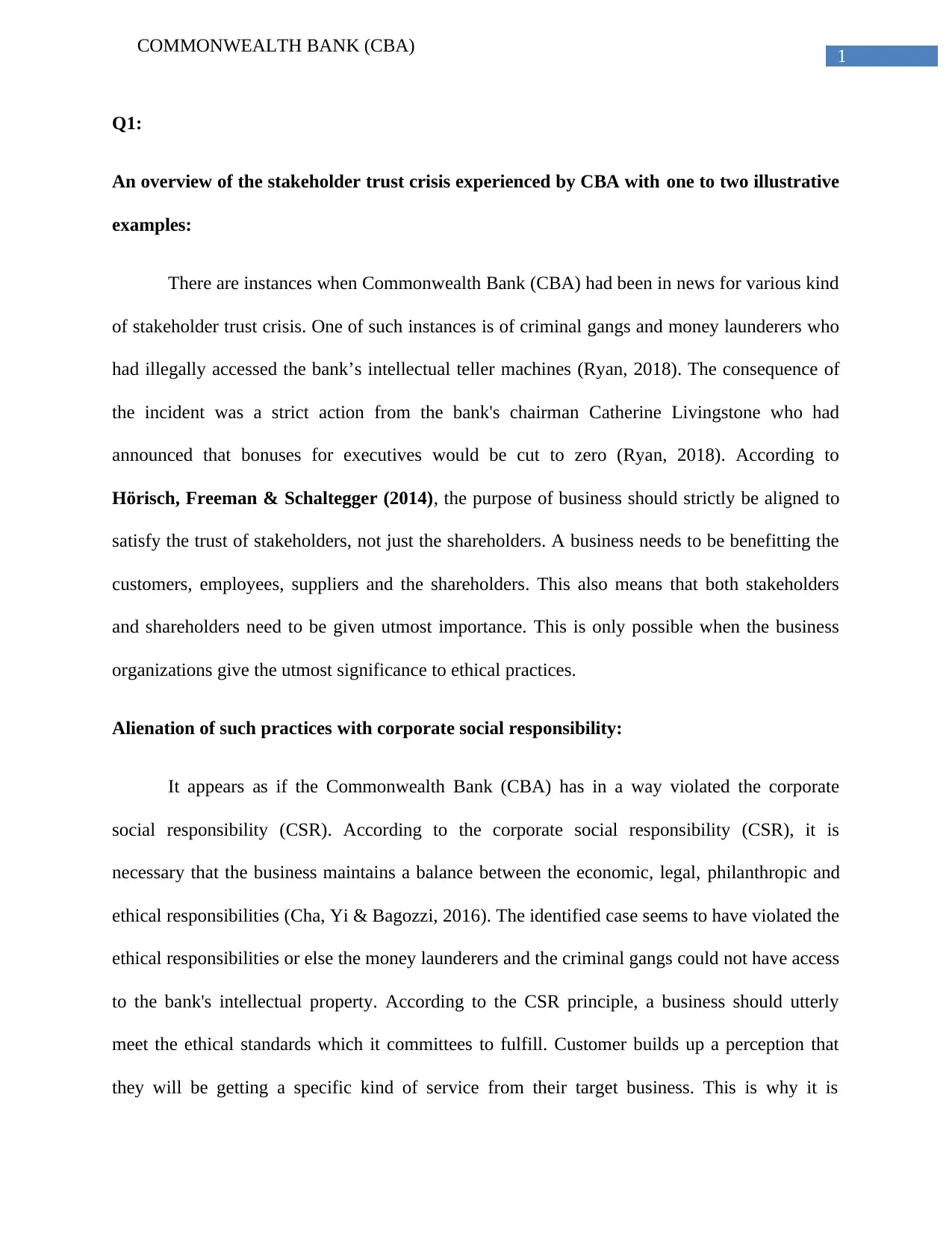
1
COMMONWEALTH BANK (CBA)
Q1:
An overview of the stakeholder trust crisis experienced by CBA with one to two illustrative
examples:
There are instances when Commonwealth Bank (CBA) had been in news for various kind
of stakeholder trust crisis. One of such instances is of criminal gangs and money launderers who
had illegally accessed the bank’s intellectual teller machines (Ryan, 2018). The consequence of
the incident was a strict action from the bank's chairman Catherine Livingstone who had
announced that bonuses for executives would be cut to zero (Ryan, 2018). According to
Hörisch, Freeman & Schaltegger (2014), the purpose of business should strictly be aligned to
satisfy the trust of stakeholders, not just the shareholders. A business needs to be benefitting the
customers, employees, suppliers and the shareholders. This also means that both stakeholders
and shareholders need to be given utmost importance. This is only possible when the business
organizations give the utmost significance to ethical practices.
Alienation of such practices with corporate social responsibility:
It appears as if the Commonwealth Bank (CBA) has in a way violated the corporate
social responsibility (CSR). According to the corporate social responsibility (CSR), it is
necessary that the business maintains a balance between the economic, legal, philanthropic and
ethical responsibilities (Cha, Yi & Bagozzi, 2016). The identified case seems to have violated the
ethical responsibilities or else the money launderers and the criminal gangs could not have access
to the bank's intellectual property. According to the CSR principle, a business should utterly
meet the ethical standards which it committees to fulfill. Customer builds up a perception that
they will be getting a specific kind of service from their target business. This is why it is
COMMONWEALTH BANK (CBA)
Q1:
An overview of the stakeholder trust crisis experienced by CBA with one to two illustrative
examples:
There are instances when Commonwealth Bank (CBA) had been in news for various kind
of stakeholder trust crisis. One of such instances is of criminal gangs and money launderers who
had illegally accessed the bank’s intellectual teller machines (Ryan, 2018). The consequence of
the incident was a strict action from the bank's chairman Catherine Livingstone who had
announced that bonuses for executives would be cut to zero (Ryan, 2018). According to
Hörisch, Freeman & Schaltegger (2014), the purpose of business should strictly be aligned to
satisfy the trust of stakeholders, not just the shareholders. A business needs to be benefitting the
customers, employees, suppliers and the shareholders. This also means that both stakeholders
and shareholders need to be given utmost importance. This is only possible when the business
organizations give the utmost significance to ethical practices.
Alienation of such practices with corporate social responsibility:
It appears as if the Commonwealth Bank (CBA) has in a way violated the corporate
social responsibility (CSR). According to the corporate social responsibility (CSR), it is
necessary that the business maintains a balance between the economic, legal, philanthropic and
ethical responsibilities (Cha, Yi & Bagozzi, 2016). The identified case seems to have violated the
ethical responsibilities or else the money launderers and the criminal gangs could not have access
to the bank's intellectual property. According to the CSR principle, a business should utterly
meet the ethical standards which it committees to fulfill. Customer builds up a perception that
they will be getting a specific kind of service from their target business. This is why it is
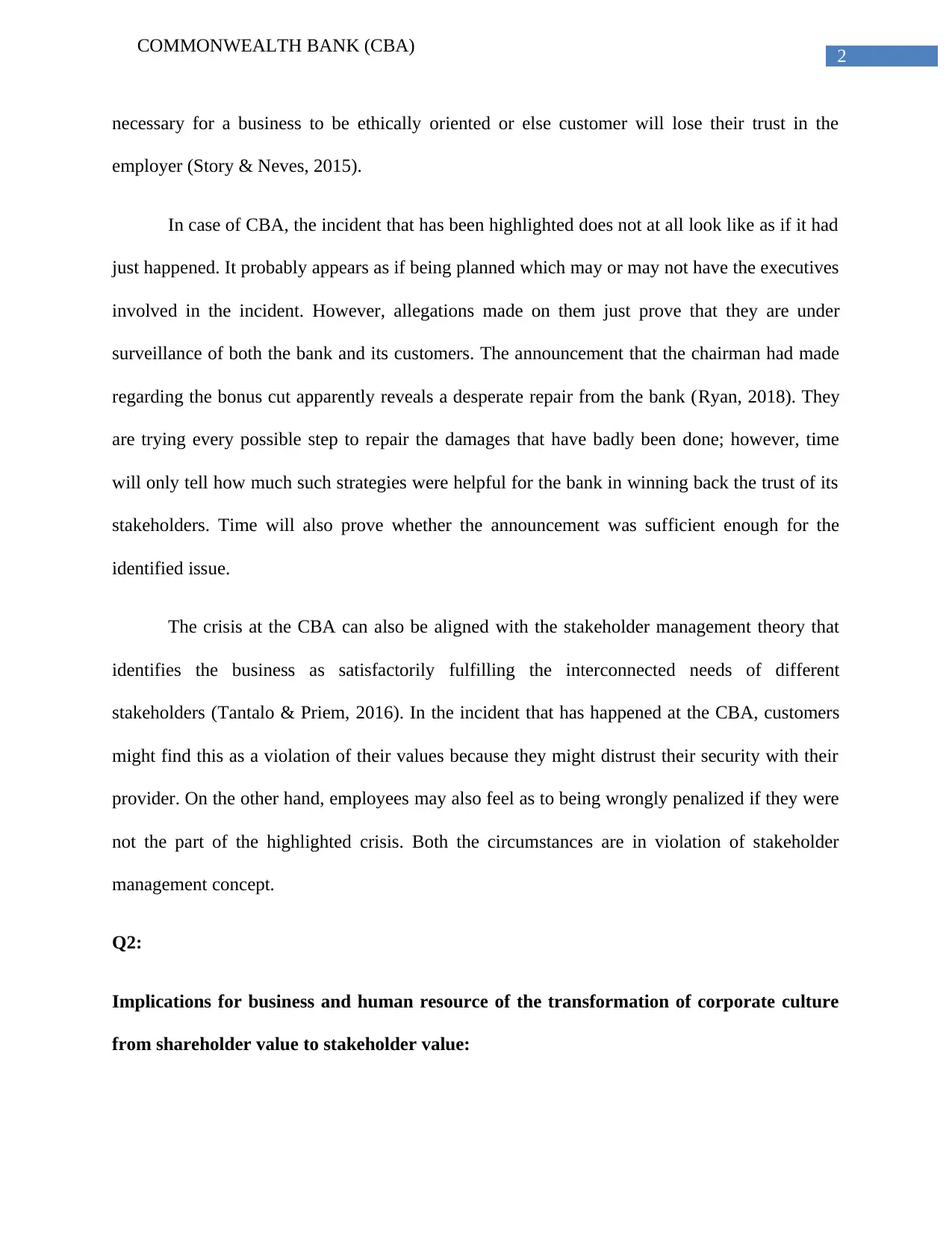
2
COMMONWEALTH BANK (CBA)
necessary for a business to be ethically oriented or else customer will lose their trust in the
employer (Story & Neves, 2015).
In case of CBA, the incident that has been highlighted does not at all look like as if it had
just happened. It probably appears as if being planned which may or may not have the executives
involved in the incident. However, allegations made on them just prove that they are under
surveillance of both the bank and its customers. The announcement that the chairman had made
regarding the bonus cut apparently reveals a desperate repair from the bank (Ryan, 2018). They
are trying every possible step to repair the damages that have badly been done; however, time
will only tell how much such strategies were helpful for the bank in winning back the trust of its
stakeholders. Time will also prove whether the announcement was sufficient enough for the
identified issue.
The crisis at the CBA can also be aligned with the stakeholder management theory that
identifies the business as satisfactorily fulfilling the interconnected needs of different
stakeholders (Tantalo & Priem, 2016). In the incident that has happened at the CBA, customers
might find this as a violation of their values because they might distrust their security with their
provider. On the other hand, employees may also feel as to being wrongly penalized if they were
not the part of the highlighted crisis. Both the circumstances are in violation of stakeholder
management concept.
Q2:
Implications for business and human resource of the transformation of corporate culture
from shareholder value to stakeholder value:
COMMONWEALTH BANK (CBA)
necessary for a business to be ethically oriented or else customer will lose their trust in the
employer (Story & Neves, 2015).
In case of CBA, the incident that has been highlighted does not at all look like as if it had
just happened. It probably appears as if being planned which may or may not have the executives
involved in the incident. However, allegations made on them just prove that they are under
surveillance of both the bank and its customers. The announcement that the chairman had made
regarding the bonus cut apparently reveals a desperate repair from the bank (Ryan, 2018). They
are trying every possible step to repair the damages that have badly been done; however, time
will only tell how much such strategies were helpful for the bank in winning back the trust of its
stakeholders. Time will also prove whether the announcement was sufficient enough for the
identified issue.
The crisis at the CBA can also be aligned with the stakeholder management theory that
identifies the business as satisfactorily fulfilling the interconnected needs of different
stakeholders (Tantalo & Priem, 2016). In the incident that has happened at the CBA, customers
might find this as a violation of their values because they might distrust their security with their
provider. On the other hand, employees may also feel as to being wrongly penalized if they were
not the part of the highlighted crisis. Both the circumstances are in violation of stakeholder
management concept.
Q2:
Implications for business and human resource of the transformation of corporate culture
from shareholder value to stakeholder value:
⊘ This is a preview!⊘
Do you want full access?
Subscribe today to unlock all pages.

Trusted by 1+ million students worldwide
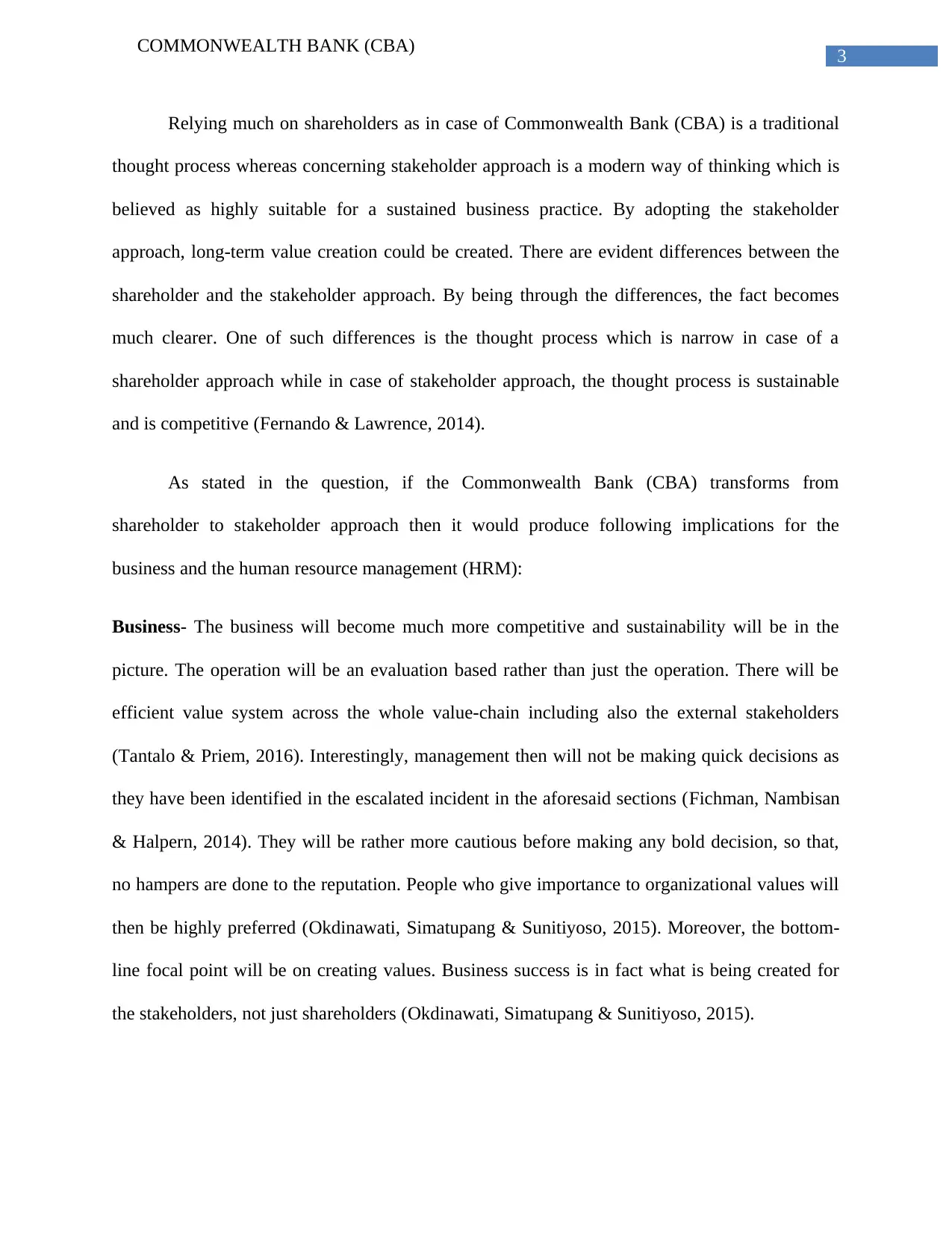
3
COMMONWEALTH BANK (CBA)
Relying much on shareholders as in case of Commonwealth Bank (CBA) is a traditional
thought process whereas concerning stakeholder approach is a modern way of thinking which is
believed as highly suitable for a sustained business practice. By adopting the stakeholder
approach, long-term value creation could be created. There are evident differences between the
shareholder and the stakeholder approach. By being through the differences, the fact becomes
much clearer. One of such differences is the thought process which is narrow in case of a
shareholder approach while in case of stakeholder approach, the thought process is sustainable
and is competitive (Fernando & Lawrence, 2014).
As stated in the question, if the Commonwealth Bank (CBA) transforms from
shareholder to stakeholder approach then it would produce following implications for the
business and the human resource management (HRM):
Business- The business will become much more competitive and sustainability will be in the
picture. The operation will be an evaluation based rather than just the operation. There will be
efficient value system across the whole value-chain including also the external stakeholders
(Tantalo & Priem, 2016). Interestingly, management then will not be making quick decisions as
they have been identified in the escalated incident in the aforesaid sections (Fichman, Nambisan
& Halpern, 2014). They will be rather more cautious before making any bold decision, so that,
no hampers are done to the reputation. People who give importance to organizational values will
then be highly preferred (Okdinawati, Simatupang & Sunitiyoso, 2015). Moreover, the bottom-
line focal point will be on creating values. Business success is in fact what is being created for
the stakeholders, not just shareholders (Okdinawati, Simatupang & Sunitiyoso, 2015).
COMMONWEALTH BANK (CBA)
Relying much on shareholders as in case of Commonwealth Bank (CBA) is a traditional
thought process whereas concerning stakeholder approach is a modern way of thinking which is
believed as highly suitable for a sustained business practice. By adopting the stakeholder
approach, long-term value creation could be created. There are evident differences between the
shareholder and the stakeholder approach. By being through the differences, the fact becomes
much clearer. One of such differences is the thought process which is narrow in case of a
shareholder approach while in case of stakeholder approach, the thought process is sustainable
and is competitive (Fernando & Lawrence, 2014).
As stated in the question, if the Commonwealth Bank (CBA) transforms from
shareholder to stakeholder approach then it would produce following implications for the
business and the human resource management (HRM):
Business- The business will become much more competitive and sustainability will be in the
picture. The operation will be an evaluation based rather than just the operation. There will be
efficient value system across the whole value-chain including also the external stakeholders
(Tantalo & Priem, 2016). Interestingly, management then will not be making quick decisions as
they have been identified in the escalated incident in the aforesaid sections (Fichman, Nambisan
& Halpern, 2014). They will be rather more cautious before making any bold decision, so that,
no hampers are done to the reputation. People who give importance to organizational values will
then be highly preferred (Okdinawati, Simatupang & Sunitiyoso, 2015). Moreover, the bottom-
line focal point will be on creating values. Business success is in fact what is being created for
the stakeholders, not just shareholders (Okdinawati, Simatupang & Sunitiyoso, 2015).
Paraphrase This Document
Need a fresh take? Get an instant paraphrase of this document with our AI Paraphraser
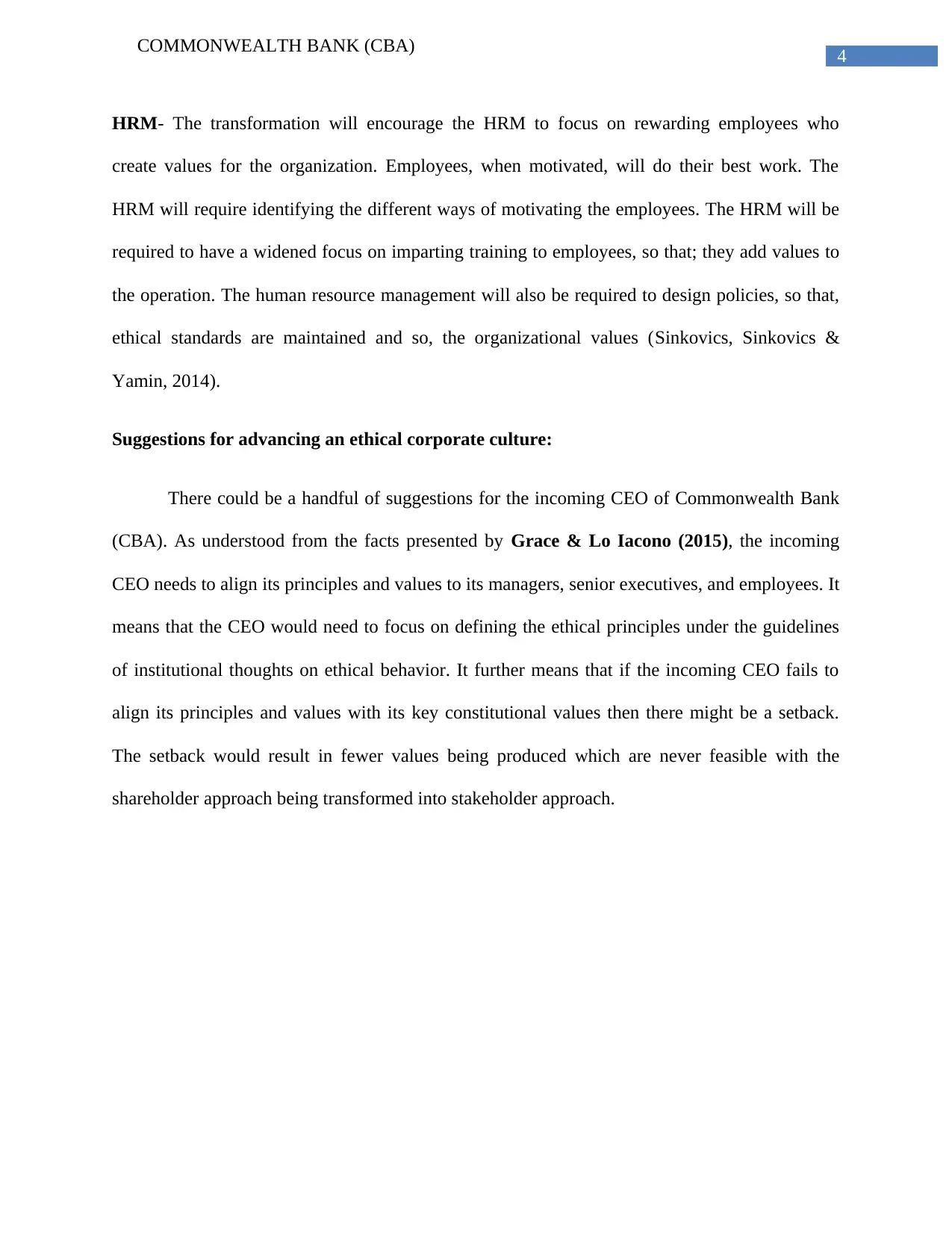
4
COMMONWEALTH BANK (CBA)
HRM- The transformation will encourage the HRM to focus on rewarding employees who
create values for the organization. Employees, when motivated, will do their best work. The
HRM will require identifying the different ways of motivating the employees. The HRM will be
required to have a widened focus on imparting training to employees, so that; they add values to
the operation. The human resource management will also be required to design policies, so that,
ethical standards are maintained and so, the organizational values (Sinkovics, Sinkovics &
Yamin, 2014).
Suggestions for advancing an ethical corporate culture:
There could be a handful of suggestions for the incoming CEO of Commonwealth Bank
(CBA). As understood from the facts presented by Grace & Lo Iacono (2015), the incoming
CEO needs to align its principles and values to its managers, senior executives, and employees. It
means that the CEO would need to focus on defining the ethical principles under the guidelines
of institutional thoughts on ethical behavior. It further means that if the incoming CEO fails to
align its principles and values with its key constitutional values then there might be a setback.
The setback would result in fewer values being produced which are never feasible with the
shareholder approach being transformed into stakeholder approach.
COMMONWEALTH BANK (CBA)
HRM- The transformation will encourage the HRM to focus on rewarding employees who
create values for the organization. Employees, when motivated, will do their best work. The
HRM will require identifying the different ways of motivating the employees. The HRM will be
required to have a widened focus on imparting training to employees, so that; they add values to
the operation. The human resource management will also be required to design policies, so that,
ethical standards are maintained and so, the organizational values (Sinkovics, Sinkovics &
Yamin, 2014).
Suggestions for advancing an ethical corporate culture:
There could be a handful of suggestions for the incoming CEO of Commonwealth Bank
(CBA). As understood from the facts presented by Grace & Lo Iacono (2015), the incoming
CEO needs to align its principles and values to its managers, senior executives, and employees. It
means that the CEO would need to focus on defining the ethical principles under the guidelines
of institutional thoughts on ethical behavior. It further means that if the incoming CEO fails to
align its principles and values with its key constitutional values then there might be a setback.
The setback would result in fewer values being produced which are never feasible with the
shareholder approach being transformed into stakeholder approach.
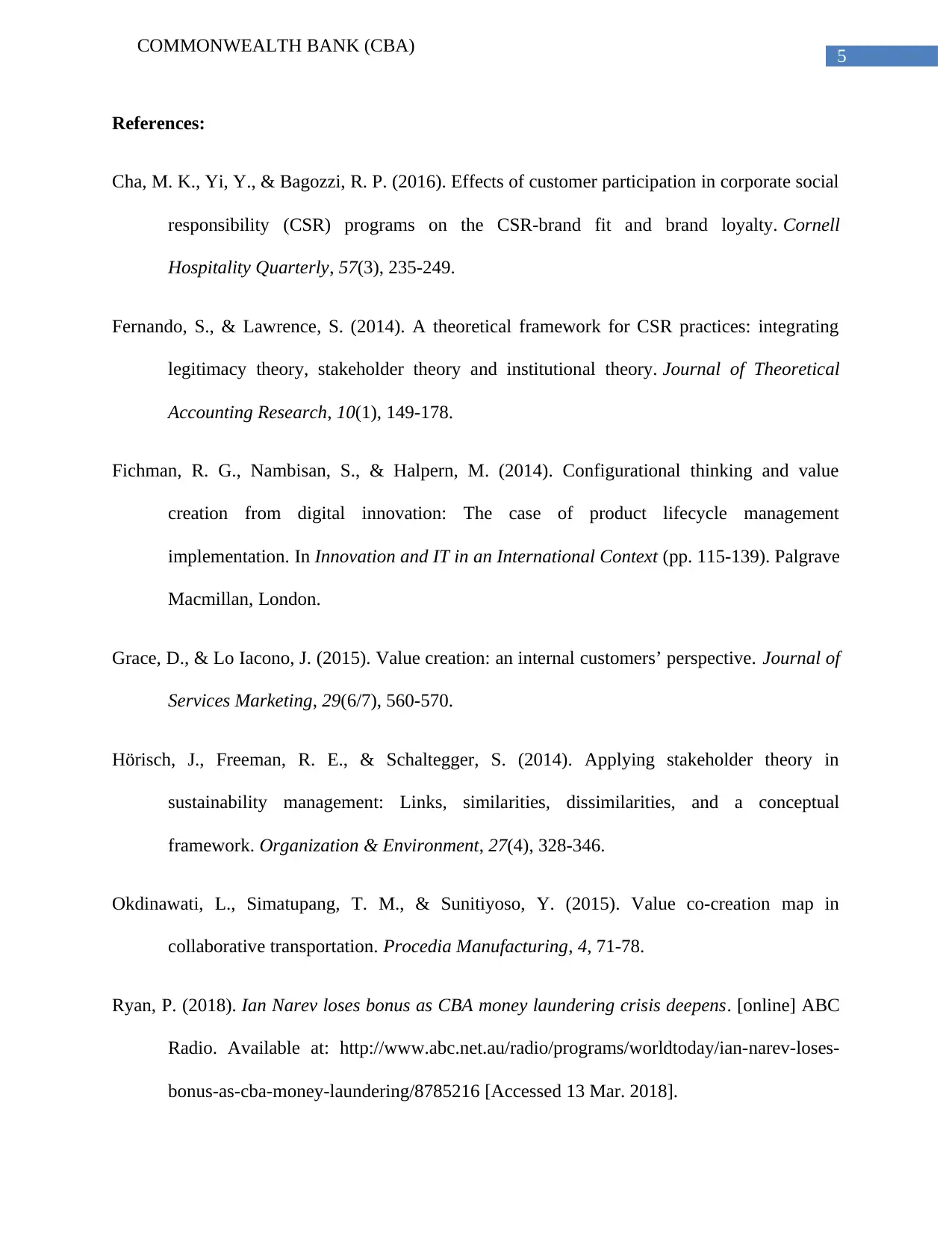
5
COMMONWEALTH BANK (CBA)
References:
Cha, M. K., Yi, Y., & Bagozzi, R. P. (2016). Effects of customer participation in corporate social
responsibility (CSR) programs on the CSR-brand fit and brand loyalty. Cornell
Hospitality Quarterly, 57(3), 235-249.
Fernando, S., & Lawrence, S. (2014). A theoretical framework for CSR practices: integrating
legitimacy theory, stakeholder theory and institutional theory. Journal of Theoretical
Accounting Research, 10(1), 149-178.
Fichman, R. G., Nambisan, S., & Halpern, M. (2014). Configurational thinking and value
creation from digital innovation: The case of product lifecycle management
implementation. In Innovation and IT in an International Context (pp. 115-139). Palgrave
Macmillan, London.
Grace, D., & Lo Iacono, J. (2015). Value creation: an internal customers’ perspective. Journal of
Services Marketing, 29(6/7), 560-570.
Hörisch, J., Freeman, R. E., & Schaltegger, S. (2014). Applying stakeholder theory in
sustainability management: Links, similarities, dissimilarities, and a conceptual
framework. Organization & Environment, 27(4), 328-346.
Okdinawati, L., Simatupang, T. M., & Sunitiyoso, Y. (2015). Value co-creation map in
collaborative transportation. Procedia Manufacturing, 4, 71-78.
Ryan, P. (2018). Ian Narev loses bonus as CBA money laundering crisis deepens. [online] ABC
Radio. Available at: http://www.abc.net.au/radio/programs/worldtoday/ian-narev-loses-
bonus-as-cba-money-laundering/8785216 [Accessed 13 Mar. 2018].
COMMONWEALTH BANK (CBA)
References:
Cha, M. K., Yi, Y., & Bagozzi, R. P. (2016). Effects of customer participation in corporate social
responsibility (CSR) programs on the CSR-brand fit and brand loyalty. Cornell
Hospitality Quarterly, 57(3), 235-249.
Fernando, S., & Lawrence, S. (2014). A theoretical framework for CSR practices: integrating
legitimacy theory, stakeholder theory and institutional theory. Journal of Theoretical
Accounting Research, 10(1), 149-178.
Fichman, R. G., Nambisan, S., & Halpern, M. (2014). Configurational thinking and value
creation from digital innovation: The case of product lifecycle management
implementation. In Innovation and IT in an International Context (pp. 115-139). Palgrave
Macmillan, London.
Grace, D., & Lo Iacono, J. (2015). Value creation: an internal customers’ perspective. Journal of
Services Marketing, 29(6/7), 560-570.
Hörisch, J., Freeman, R. E., & Schaltegger, S. (2014). Applying stakeholder theory in
sustainability management: Links, similarities, dissimilarities, and a conceptual
framework. Organization & Environment, 27(4), 328-346.
Okdinawati, L., Simatupang, T. M., & Sunitiyoso, Y. (2015). Value co-creation map in
collaborative transportation. Procedia Manufacturing, 4, 71-78.
Ryan, P. (2018). Ian Narev loses bonus as CBA money laundering crisis deepens. [online] ABC
Radio. Available at: http://www.abc.net.au/radio/programs/worldtoday/ian-narev-loses-
bonus-as-cba-money-laundering/8785216 [Accessed 13 Mar. 2018].
⊘ This is a preview!⊘
Do you want full access?
Subscribe today to unlock all pages.

Trusted by 1+ million students worldwide
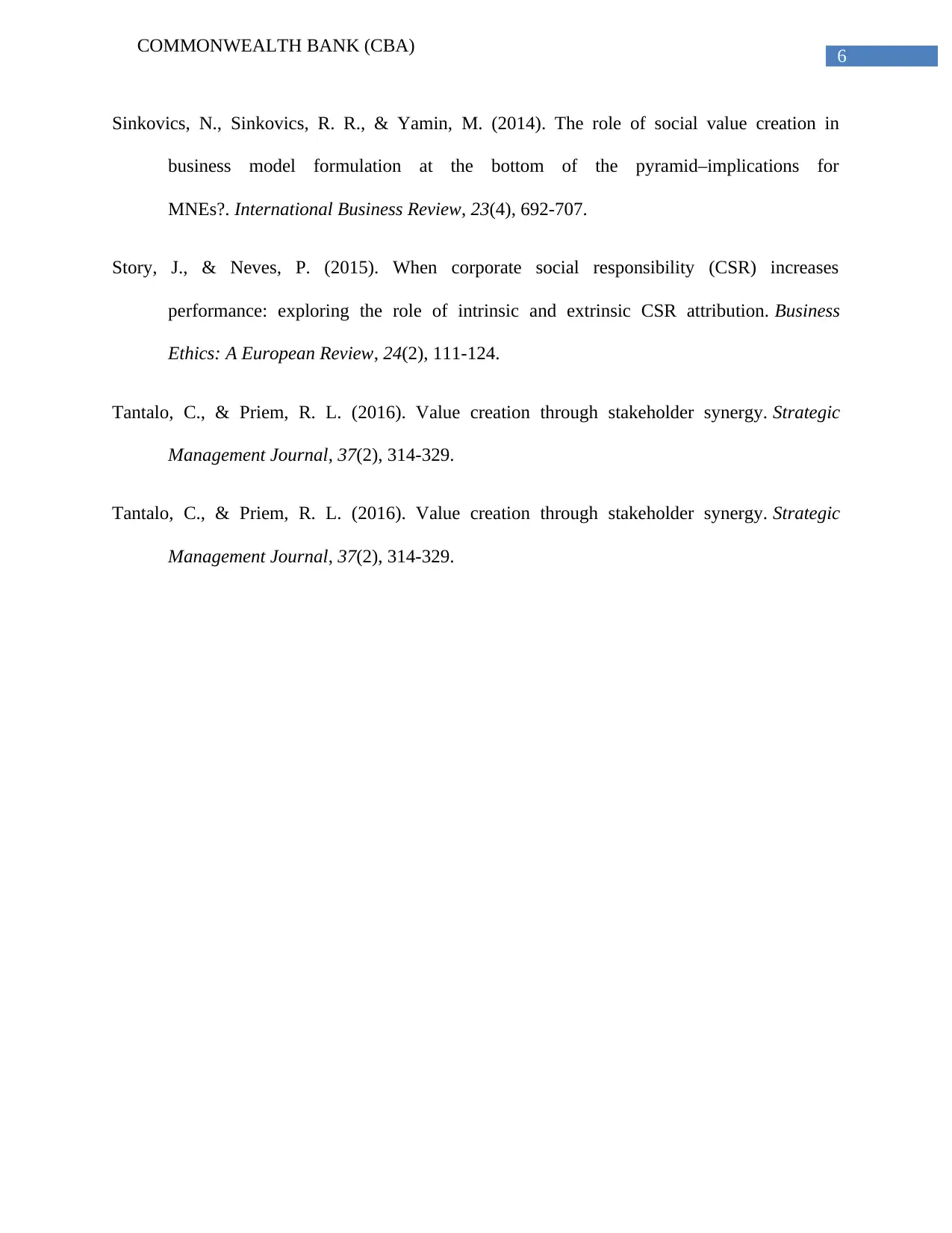
6
COMMONWEALTH BANK (CBA)
Sinkovics, N., Sinkovics, R. R., & Yamin, M. (2014). The role of social value creation in
business model formulation at the bottom of the pyramid–implications for
MNEs?. International Business Review, 23(4), 692-707.
Story, J., & Neves, P. (2015). When corporate social responsibility (CSR) increases
performance: exploring the role of intrinsic and extrinsic CSR attribution. Business
Ethics: A European Review, 24(2), 111-124.
Tantalo, C., & Priem, R. L. (2016). Value creation through stakeholder synergy. Strategic
Management Journal, 37(2), 314-329.
Tantalo, C., & Priem, R. L. (2016). Value creation through stakeholder synergy. Strategic
Management Journal, 37(2), 314-329.
COMMONWEALTH BANK (CBA)
Sinkovics, N., Sinkovics, R. R., & Yamin, M. (2014). The role of social value creation in
business model formulation at the bottom of the pyramid–implications for
MNEs?. International Business Review, 23(4), 692-707.
Story, J., & Neves, P. (2015). When corporate social responsibility (CSR) increases
performance: exploring the role of intrinsic and extrinsic CSR attribution. Business
Ethics: A European Review, 24(2), 111-124.
Tantalo, C., & Priem, R. L. (2016). Value creation through stakeholder synergy. Strategic
Management Journal, 37(2), 314-329.
Tantalo, C., & Priem, R. L. (2016). Value creation through stakeholder synergy. Strategic
Management Journal, 37(2), 314-329.
1 out of 7
Your All-in-One AI-Powered Toolkit for Academic Success.
+13062052269
info@desklib.com
Available 24*7 on WhatsApp / Email
![[object Object]](/_next/static/media/star-bottom.7253800d.svg)
Unlock your academic potential
Copyright © 2020–2026 A2Z Services. All Rights Reserved. Developed and managed by ZUCOL.